Tuscany Disabled Access Review by John Sage
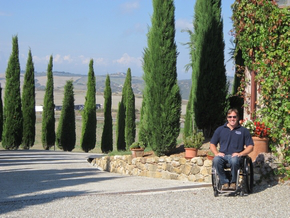 If you have already been to Italy and loved it (who doesn’t?), then you can easily spend a week visiting accessible destinations in Tuscany.
If you have already been to Italy and loved it (who doesn’t?), then you can easily spend a week visiting accessible destinations in Tuscany.
Tuscany disabled access presents different challenges than other major Italian cities. In Rome you might deal with long distances and few accessible transportation options, and in Venice you might deal with bridges.
In Tuscany, you won’t have those challenges but you will encounter plenty of hills, inaccessible buildings, and cobblestones. Don’t let that discourage you though. With the right planning, all of the Tuscany disabled access challenges can be circumvented and you can have a wonderful vacation!
View our Accessible Tuscany Vacation Packages
Best Aspects of Tuscany Disabled Access
Outstanding Accessible Experiences – Tuscany offers numerous accessible experiences including private accessible sightseeing flights, visits to 1000 year old wineries, Italian cooking classes, sightseeing in Renaissance and Medieval villages, relaxing by the pool at your private villa, and more. With so much to do, you can easily spend a week or two here!


Stay in a Single City and Visit Several Destinations – If you choose a centrally-located home base in Chianti, Siena, or the Val d’Orcia valley, you can visit multiple destinations with easy day-trips.
Watch John Sage Describe Siena Disabled Access
Variety of Destinations – In a single trip to Italy, you can easily visit big cities (like Florence) and small cities (like Radda in Chianti). You can see Renaissance architecture in Siena (show below on the left) and medieval architecture in Castellina in Chianti. Of course don’t forget to mix in some winery visits (shown below on the right)!
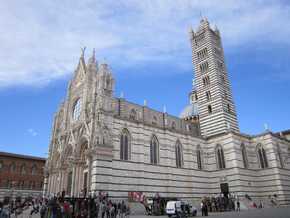
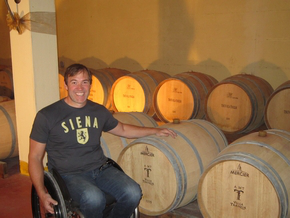
Some Cities Have Flat Sections – In terms of hilliness, Tuscany disabled access is better in some cities than others. Florence is flat on the northern side of the Arno River. Lucca and Pisa are flat (but not centrally located). Greve in Chianti is flat but not as charming as other cities, and we have been told there are no accessible hotels rooms in the city center.
Great Destinations for Romance or Families – Romantic dinners inside medieval fortresses, visits to wineries, and sunsets are just a few of the romantic offerings in Tuscany. Families traveling with kids can rent an accessible Tuscany villa with a pool, take family cooking classes, and taste gelato in every town!
Small Towns in Chianti Mean No Long Walking/Rolling Distances – Many of the towns in Chianti still have the same size as they did in the Middle Ages, so you won’t have to walk/roll long distances!
San Gusmè is a small town with short walking/rolling distances

Can Drive Yourself – Many disabled travelers want to drive themselves from attraction to attraction in large cities like Rome, Florence, Paris, and Istanbul…and it’s a bad idea because the lack of accessible parking spaces. In Tuscany, disabled accessible parking places aren’t abundant but sufficient enough to make renting a car and driving yourself a possibility.
Cheaper than Popular Italian Destinations like Rome and Venice – If you find an accessible villa or accessible farmhouse to rent for a week in Tuscany, you can count on spending significantly less on your vacation than if you were traveling to Rome or Venice where you can easily spend more than €200 per night on accommodation.
Worst Aspects of Tuscany Disabled Access
Steep Hills – In the Middle Ages, towns were built on hilltops to defend against invasions from small neighboring towns and the big powerhouses of Florence and Siena. Unfortunately this means that Tuscany disabled access greets disabled visitors with some steep hills like those shown in the video below.
Abundant Cobblestones – Many city centers, like Montepulciano and Monteriggioni shown below, are covered in cobblestones which can be challenging for wheelchair users and mobility scooter users.
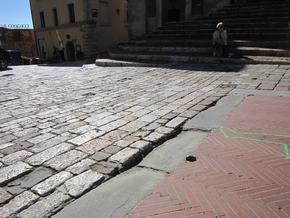
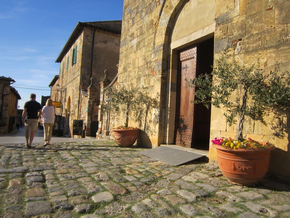
No Accessible Public Transportation between Cities – Many of the small towns are connected by public bus but they aren’t accessible. So you will need to drive yourself or hire a private driver.
“Accessible” Villas and Agriturismos might not be Accessible – When we inspected properties across Tuscany, we found that several that were described as “accessible” had a step to reach the bedroom (shown on the left) or a narrow shower with little room for a wheelchair user to transfer (shown on the right).
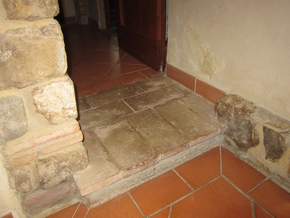
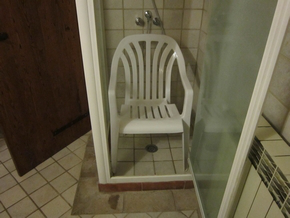
Few Accessible Hotels inside City Centers – Since many of the city centers are composed of buildings built hundreds of years ago, there are few Tuscany disabled accessible hotels inside the city centers.
Limited Parking Options – Parking lots in Tuscan villages are often located a few blocks outside the city centers and can fill up during the tourist season. You should get a parking map of each city before visiting.
Steps into Many Wineries and Attractions – Most wineries are not wheelchair accessible and can have one or more steps at the entrance (example shown below on the left). Many of the medieval attractions like the Montalcino fortress (shown below on the right) have many steps to explore them.
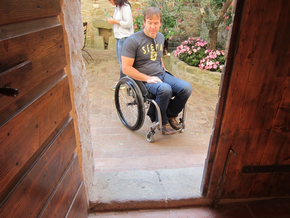
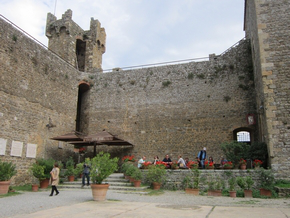
Expensive Gasoline/Petrol – Whether you rent your own car or hire a driver, visiting Tuscany requires driving from town to town. Depending on where you live, gasoline/petrol may be much more expensive than you’re used to and you should factor it into your budget.
Narrow Winding Roads Make Driving Slow – Even though Tuscany is not very big, the roads between towns can be very winding requiring you to drive slow. If you select a single accommodation location, you might spend 2 to 3 hours on the road each day. It’s a good idea to split up your trip and stay in two or three different cities during your vacation (e.g. Florence, Chianti, and southern Tuscany).
Watch John Sage Describe How to Plan an Accessible Tuscan Vacation
Want a 100% Accessible Vacation?
View our Tuscany Accessible Travel Packages
Read More:


